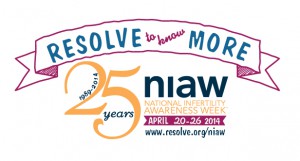April 20th– 26th is National Infertility Awareness Week. RESOLVE, the National Infertility Association, urges all women this year to resolve to know more about infertility.
Unfortunately, infertility is more common than you might think: one in every eight couples trying to conceive will experience the pangs of this reproductive disease. So even if you don’t experience infertility yourself, it’s very likely you’ll have a good friend or loved one who will.
Infertility is a complex condition caused by a wide range of things. Sometimes, the cause is never determined.
Many couples choose to undergo fertility treatments, which can leave them physically, emotionally, and financially exhausted. While many couples are able to resolve the issue effectively, there are a few who don’t, and must cope with the reality of not being able to have biological kids.
When dealing with infertility, be it your own or someone else’s, it is important to be educated about the condition and to know your facts. Here are four major myths you should never believe when it comes to infertility:
Myth #1: Relaxing will help you get pregnant, and so will adopting.
Both of these myths are absolutely untrue. Infertility is a medical condition. Feelings of anxiety and stress stem from infertility, they don’t cause it. It is good for couples facing infertility to find ways to cope with their stress for their overall wellbeing, but it doesn’t mean that “chilling out” will help them conceive.
Likewise, starting the adoption process will not magically reverse infertility. Furthermore, suggesting to a couple to adopt in order to become pregnant suggests that adoption is not a positive option in and of itself.
Myth #2: Getting Pregnant Can Take a Long Time.
It’s true that getting pregnant can take some time. In fact, The American College of Obstetricians and Gynecologists consider a year of trying to conceive for most couples to be completely normal. But if a couple has actively been trying to conceive for a year, then it’s time to talk to a reproductive endocrinologist (a.k.a. infertility specialist) about the possible causes and treatments of their infertility.
There are also certain cases when you ought to talk with your doctor after just 6 months of trying to conceive:
- You’re over the age of 35
- You have a known reproductive condition such as Endometriosis
- You have abnormal periods.
For 50% of couples, seeking infertility treatment will help them in their quest to become parents.
Myth #3: Infertility is a “sign” that a couple shouldn’t be parents.
Never, ever say this to anyone struggling with infertility. It is both untrue and extremely insensitive. If you’re struggling with infertility, never believe this, even in your darkest days. Infertility is a medical condition, just like diabetes or cancer. It’s not because you don’t “deserve” to be parents.
Myth #4: Infertility is a Woman’s Problem:
According to the data on infertility, one-third of cases are the result of a fertility problem with the woman, one-third are caused by a fertility problem with the man, and in one-third of the cases, the reason is never determined. In the end, it doesn’t matter whose “fault” infertility is: it can still be a painful and draining condition to deal with.
Infertility is a widespread condition, and yet it isn’t frequently talked about. We can all make the struggle of infertility less painful by becoming educated about the condition. If you have a friend or loved one struggling with infertility, be sure to learn what you can about the condition so that you can help support your loved one in a positive manner.
If you are facing infertility, consider seeking out a support group to help you cope with the stress and uncertainty of this condition.
And for a comprehensive overview of infertility (causes, treatments, etc.), take a look at the following series located in our knowledge center:
The compassionate doctors, nurses and midwives at Northern Florida’s All About Women are here to help couples identify, cope and treat their infertility issues. We want couples to know that there’s a lot of support out there…
Call our Gainesville or Lake City office today and schedule an appointment to discuss your individual situation with an infertility specialist.



